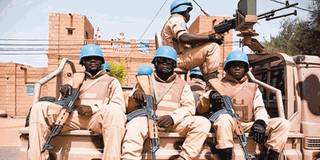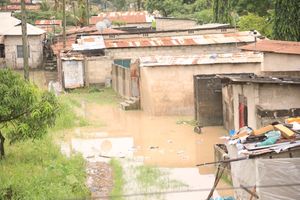Talks with jihadists? A radical idea gains currency in Mali

In Mali, which has been wracked by violence and is prone to frequent and deadly jihadist attacks, the once unthinkable is now being asked by observers: is it time to negotiate with the extremists?
“Every analysis of the Malian crisis shows that a purely military solution is not possible,” said Ambroise Dakouo of the Alliance for Rebuilding Governance in Africa (ARGA), a think tank. “We cannot be dogmatic. We must be open to dialogue with these groups to find out if conciliation is possible. We must find out what they want and what we can concede.”
Waves of foreign soldiers, along with Malian government forces, have failed to eradicate the extremist groups that took control of the northern desert in 2012. Large tracts of territory remain lawless despite a 2015 peace deal intended to end the longer-term conflict that has pitted nomadic Tuaregs in the north against the government, based in the south.
The jihadists, who were not party to that accord, were ousted in 2013 from the northern towns they had captured. But their attacks continue to claim victims and are spreading to the centre of the country, affecting growing portions of the south. Just last week, militants disguised as UN peacekeepers attacked two bases in the ancient desert city of Timbuktu, in northern Mali, killing one peacekeeper and injuring dozens more.
In a late March incident, suspected jihadists attacked a hotel in central Mali shortly after the prime minister visited. In early April, dozens of suspected jihadists clashed with French and Malian troops near the Niger border.
Malian officials hope the new G5 Sahel sub-regional force, comprising troops from Mali, Burkina Faso, Niger, Chad, and Mauritania, can finally make headway against the Islamist militants.
But influential observers, including several key political and religious figures, have been stepping up their push for an entirely different strategy: negotiations with jihadist groups.
Tiébilé Dramé is one of them. He is a former foreign minister who helped negotiate the so-called Ouagadougou Accord, which enabled people in areas controlled by armed groups to vote in Mali’s 2013 presidential elections.
Ali Nouhoum Diallo, a former president of the national assembly, is another. And they are joined by Mahmoud Dicko, the president of the High Islamic Council of Mali and one of the country’s most powerful clerics.
The idea of talking to extremist groups, ruled out so far by the government, has become less and less taboo. A recent opinion poll showed that a slim majority of Malians (55.8 percent) favour such negotiations. The poll by the Friedrich Ebert Foundation, conducted in November, tapped Malians in all the regional capitals as well as the District of Bamako.
The proposal of dialogue is not completely new. It was discussed during the 2017 Conference of National Understanding in Bamako. At the end of the discussions, the participants – about 300 representatives of government, the opposition, armed groups and civil society – called for open meetings to find out what the jihadists really want.
A year on, the idea appears to be gaining currency, but hard questions remain.
Iyad Ag Ghaly and Amadou Koufa are the two main extremist figures in Mali. After failing to become leader of the National Movement for the Liberation of Azawad (MNLA) – the first armed group to begin hostilities against the Malian army in 2012 – Ag Ghaly turned to radicalism and founded Ansar Dine, an al-Qaeda-linked group that sought to establish strict Islamic law in Mali. It operates essentially in the north.
Koufa, a Fulani preacher from the central Mopti Region, set up the jihadist Macina Liberation Front, which operates in the centre of the country, in 2015.
Last March, these two groups, along with the Saharan branch of Al-Qaeda in the Islamic Maghreb (AQIM), announced an alliance under the banner of Jamaat Nosrat al-Islam wal-Mouslimin (Group for the Support of Islam and Muslims, JNIM or GNIM).
According to Dakouo, of the ARGA think tank, one of the aims of dialogue with the extremists would be to isolate the foreign fighters within their ranks. “We would then have a clear idea of the positions of the jihadist movements that are Malian,’ he said. “Then we would also know that the other groups are not Malian, and that would let us know the true nature of our adversaries.”
This strategy could also help to end the victimisation of certain ethnic groups, such as the Fulani, often mistakenly assumed to be militant followers of Koufa.
In May 2017, emissaries of Koufa and Ag Ghaly reportedly approached Ali Nouhoum Diallo and Mahmoud Dicko, the former president of the national assembly and the influential cleric. Dicko, the cleric, is well placed to act as an intermediary for these extremist leaders if such approaches are to be renewed, said Professor Kissima Gakou, a criminologist at the University of Bamako who specialises in security issues.




